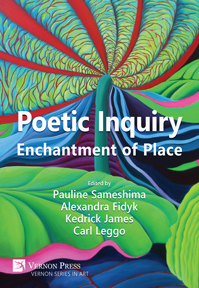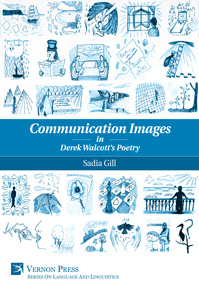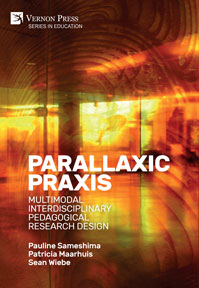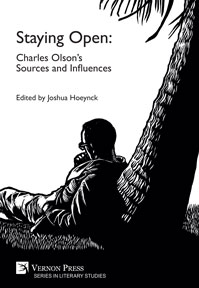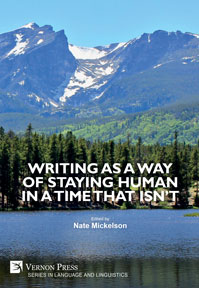Poetic Inquiry as Social Justice and Political Response
Sandra L. Faulkner, Abigail Cloud (Eds.)
by Sarah MacKenzie-Dawson (Bucknell University, USA), Sandra L. Faulkner (Bowling Green State University, USA), Pauline Sameshima (Lakehead University, Canada), Sean Wiebe (University of Prince Edward Island, Canada), Laura Apol (Michigan State University, USA), Robin Barre , Lee Beavington (SSHRC; Simon Fraser University, Canada), Maya Borhani (University of Victoria in British Columbia, Canada), Kimberly Dark (California State University San Marcos, USA), Sandra Filippelli (University of British Columbia, Canada), Amanda N. Gulla , Natalie Honein , Mark D. McCarthy (Michigan State University, USA), John J. Guiney Yallop (School of Education at Acadia University, Canada), Margaret McKeon (University of British Columbia, Canada), Heather McLeod (Memorial University in St. John’s, Newfoundland, Canada), Robert Christopher Nellis (Red Deer College School of Education,Canada), Bonnie Nish (Pandora’s Collective Outreach Society; University of British Columbia, Canada), Gisela Ruebsaat , Molly H. Sherman (Harvest Collegiate High School in New York City; Lehman College, University of New York, USA), Sheila Squillante (Chatham University, USA), Sheila Stewart (New College Writing Centre, University of Toronto, Canada), Anne McCrary Sullivan (National Louis University, USA), Heidi van Rooyen (Human Sciences Research Council in South Africa, ZA), Alexandra Fidyk (University of Alberta)
Purchase this book
(click here to change currency)
'Poetic Inquiry as Social Justice and Political Response' is both timely and desperately needed. One of the strongest points about the book is the excellent writers contained within--for those of us who use poetry as a methodology, a majority of the names are totally recognizable because they are well-published and understand the power of poetry in representing research. There are a wide variety of topics and approaches which is delicious for the reader----it definitely was for me! Some absolute standouts for me where Sheila Stewart. Anne McCrary Sullivan, Sandra Faulkner and Kimberly Dark. This book will have a massive impact in the field of qualitative inquiry because it exemplifies how poetic inquiry has come out from under the shadows as an alternate form of research (wherein researchers were always apologizing or explaining the method) to a primary, viable way of presenting research. All of the big issues are represented: feminism, resistance, social justice, wellbeing, war, race and identity, ecopoetics, etc. are covered. The depth and breadth of this collection makes for a concise and informed collection!
Michelle Reale
English and Music Dept., Arcadia University
This volume speaks to the use of poetry in critical qualitative research and practice focused on social justice. In this collection, poetry is a response, a call to action, agitation, and a frame for future social justice work. The authors engage with poetry’s potential for connectivity, political power, and evocation through methodological, theoretical, performative, and empirical work. The poet-researchers consider questions of how poetry and Poetic Inquiry can be a response to political and social events, be used as a pedagogical tool to critique inequitable social structures, and how Poetic Inquiry speaks to our local identities and politics. The authors answer the question: “What spaces can poetry create for dialogue about critical awareness, social justice, and re-visioning of social, cultural, and political worlds?” This volume adds to the growing body of Poetic Inquiry through the demonstration of poetry as political action, response, and reflective practice. We hope this collection inspires you to write and engage with political poetry to realize the power of poetry as political action, response, and reflective practice.
Foreword
Poetic Inquiry as Social Justice and Political Response
Sandra L. Faulkner, Bowling Green State University
I: Poetic Inquiry as Pedagogical Practice and Community Building
1. Pedagogy, Poetry, and Politics: Using Poetic Inquiry to Convey, Challenge, and Co/Create a Response to Literature
Laura Apol, Michigan State University
Mark McCarthy, Michigan State University
2. Contemplative, Somatic, and Arts-Integrated Methods for Girls’ Well-being
Alexandra Fidyk, University of Alberta
3. Difficult, Beautiful Things: Young Immigrant Writers Find Voice and Empowerment through Art and Poetry
Amanda N. Gulla
Molly H. Sherman,
Harvest Collegiate High School in New York City; Lehman College, University of New York
II: Poetic Inquiry into Place and Local Identities
4. Ecopoetics of the Amazon
Lee Beavington, SSHRC; Simon Fraser University
5. Opening into Relational Responsibility with Poetry
Margaret McKeon, University of British Columbia
6. The Ground Beneath Our Feet: Poetry and Settler Colonialism
Sheila Stewart,
New College Writing Centre, University of Toronto
7. Learning Calabar: Notes from a Year in Nigeria
Anne McCrary Sullivan, National Louis University
8. Race and Identity in Post-Apartheid South Africa: Making Coloredness Visible through Poetic Inquiry
Heidi van Rooyen,
Human Sciences Research Council in South Africa, ZA
9. Claiming Identity in the Presence of Oppressive Silenc(e)(ing)
John J. Guiney Yallop,
School of Education at Acadia University
III: Poetic Inquiry as Praxis and Connection
10. Chronos Eats His Children: A Poetic Inquiry into Time as a Social Justice Issue
Robin Reynolds Barre
11. Poetry as Incantation
Kimberly Dark, California State University San Marcos
12. Stitching Inward: Pausing Poetically Toward Connection, Possibility, and Praxis
Sarah K. MacKenzie-Dawson, Bucknell University
13. Toward a Poetics of Graceful Pedagogy: Interspecies Encounter and a Certain Silence
Robert Christopher Nellis,
Red Deer College School of Education
14. Love and Bones Continued: Finding Dialogue about Histories Shared and Diverse through Poetic Inquiry in a Time of Discord
Bonnie Nish,
Pandora’s Collective Outreach Society; University of British Columbia
IV: Poetic Inquiry as Political Response
15. Poetry through Song: Sounds of Resistance
Maya T. Borhani,
University of Victoria in British Columbia
16. Nasty Women Join the Hive: A Nasty Womanifesto Invitation for White Feminists
Sandra L. Faulkner, Bowling Green State University
Sheila Squillante, Chatham University
17. Peace (Ahimsa) Pact
Sandra Filippelli, University of British Columbia
18. Spectators in a Tragedy
Natalie Honein
19. War and the Lyric Voice: An Intergenerational Narrative
Gisela Ruebsaat
Heather McLeod,
Memorial University in St. John’s, Newfoundland
20. Reframing and Reflaming Social Justice through Poetry
Sean Wiebe, University of Prince Edward Island
Pauline Sameshima, Lakehead University
Biographies
Index
Abigail Cloud is a poet and Senior Lecturer at Bowling Green State University. She is Editor-in-Chief of Mid-American Review and faculty advisor to Prairie Margins. Her first collection, Sylph (Pleiades, 2014), was a Lena-Miles Wever Todd Prize winner. Her research interests include Laban’s effort principles as applied to language and mortality theory.
Sandra L. Faulkner is Professor of Communication and Director of Women’s, Gender, and Sexuality Studies at Bowling Green State University. Her interests include qualitative methodology, poetic inquiry, and the relationships among culture, identities, and sexualities in close relationships. Her poetry appears in places such as Literary Mama and damselfly. She authored three chapbooks, Hello Kitty Goes to College (dancing girl press, 2012), Knit Four, Make One (Kattywompus, 2015), and Postkarten aus Deutschland (http://liminalities.net/12-1/postkarten.html), and a memoir in poetry, Knit Four, Frog One (Brill/Sense, 2014). Her latest book is Poetic Inquiry: Craft, Method, and Practice (Routledge). She was the recipient of the 2016 Norman K. Denzin Qualitative Research Award.
See also
Bibliographic Information
Book Title
Poetic Inquiry as Social Justice and Political Response
ISBN
978-1-62273-649-2
Edition
1st
Number of pages
266
Physical size
236mm x 160mm

![Poetic Inquiry as Social Justice and Political Response [Hardback]](/file/8810/aad313b12a718d532cde16c297ef33a8/1556529733.jpg)


